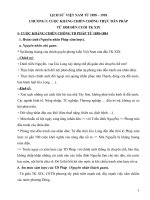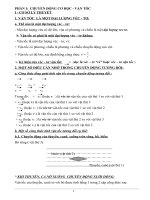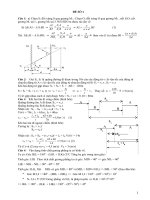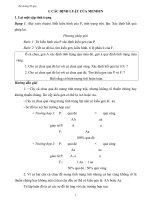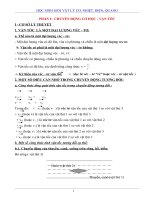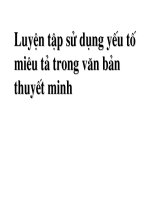- Trang chủ >>
- Sư phạm >>
- Quản lý giáo dục
Tài liệu bồi dưỡng anh văn 9
Bạn đang xem bản rút gọn của tài liệu. Xem và tải ngay bản đầy đủ của tài liệu tại đây (162.17 KB, 11 trang )
<span class='text_page_counter'>(1)</span><div class='page_container' data-page=1>
<b>PHỊNG GD – ĐT MANG THÍT NĂM HỌC : 2019-2020</b>
<b>TRƯỜNG THCS MỸ AN</b>
<b>TÀI LIỆU BỒI DƯỠNG HỌC SINH TIẾNG ANH LỚP 9</b>
<b>A/ PHẦN 1: LÝ THUYẾT VÀ BÀI TẬP THEO CHỦ ĐỀ</b>
<b>1/ CHỦ ĐỀ 1: TENSES: </b>
<b>1. Present Simple: (Hiện tại đơn) => Thói quen, sự thật khơng đổi, chân lý</b>
* Active: S + V(s,es) / (be)=> am, is, are ( phủ định Vthường mượn: does / do)
* Passive: S + am/is/are + V3/ed
* Nhận biết: Every + time / always, usually, often, sometimes, seldom, never
<b>2. Present Progressive:(Hiện tại tiếp diễn)=> Hành động đang diễn ra lúc nói – Hành động ở tương lai gần</b>
* Active: S + am/is/are + Ving
* Passive :S + am/is/are + being + V3/ed
* Nhận biết: now, at present, at the/this moment, Từ + ! ( Look!, Look out!, Be careful!, Listen! . . . )
<b>3. Present Perfect:(Hiện tại hoàn thành)</b>
* Active: S + has/have+ V3/ed
* Passive: S + has/have+ been + V3/ed
a. since+ time(điểm/mốc thời gian)/ for + time(khoảng thời gian)=> Hành động kéo dài từ quá khứ đến
hiện tại vẫn còn
b. already, recently = lately, (not) yet, just, ever, never=> Hành động không rõ thời gian
c. This is the first/ second time, twice, three times, several/ many times => Số làn thực hiện hành động
tính tới lúc nói
<b>4. Past Simple: (Quá khứ đơn)=> hành động đã xảy ra và kết thúc tại 1 thời điểm xác định trong quá khứ</b>
* Active: S + V2/ed / (be)=> was / were ( phủ định Vthường mượn did)
* Passive: S + was/were + V3/ed
* Nhận biết: last +time, time + ago, yesterday, When I was young/a student/aboy(chỉ lúc còn bé/ trẻ/
trước đây)
<b>5. Past Progressive(Quá khứ tiếp diễn)</b>
* Active: S + was/were + Ving
* Passive: S + was/were + being + V3/ed
<b>a. Hành động quá khứ có điểm thời gian xác định(at 8 o’clock last night, at this time last week. . . ) </b>
b. While: 2 hành động quá khứ tiếp diễn diễn ra song song tại 1 thời điểm trong quá khứ
<b> c. When, while=> Cặp thì quá khứ tiếp diễn và quá khứ đơn(thường sau “When” dùng quá khứ, sau “ </b>
While” dùng quá khứ tiếp diễn)=> 1 hành động đang diễn ra, thì 1 hành động khác xảy đến trong quá khứ
<b>6. Future Simple ( Tương lai đơn)=> Hành động sắp hoặc sẽ thực hiện trong tương lai</b>
* Active: S + will + V infinitive
* Passive: S + will + be + V3/ed
* Nhận biết: next + time, tomorrow, tonight, soon, in + time(trong vòng bao lâu)
<b>7. Modals: can/ could, may/might, should, ought to, must, have to, be going to ( khả năng, xin phép, </b>
khuyên, buộc) * Active: S + modal + V infinitive
* Passive: S + modal + be + V3/ed
<b>2/ CHỦ ĐỀ 2: FORM: </b>
<b>1.Vinfinitive: sau V: let, make/ made, help, have(nhờ) + O(người), would rather(thích . . . . hơn), </b>
V(modals): can, could, may might, must=have to, should, ought to
<b> 2.To infinitive: sau:Vthường: would like, want, decide, ask, tell, advise, get, intend,từ hỏi (what, where, </b>
how . . .)
<b> 3.Ving : sau V enjoy, love, (dis)like, hate, finish, keep, practice, look forward to,avoid, mind, giới từ(at, on, </b>
in . .)
</div>
<span class='text_page_counter'>(2)</span><div class='page_container' data-page=2>
<b> * Put the verbs in brackets in the correct tenses</b>
1. Mr. John is interested in __________(learn) Vietnamese.
2. I would rather__________ (stay) at home than ___________ (go) out.
3. We decided ______________(take) a trip to the countryside.
4. I don’t mind ____________(carry) your luggage.
5. We advised him ____________( not talk) in class.
6. He should ___________( report) all the story to the police.
7. Did you have someone___________( mend) your bike ? _ Yes, I had my bike _________ ( mend)
8. The novel __________ ( write) by Nguyen Du was famous.
<b> 3/ CHỦ ĐỀ 3: CONDITIONALS ( Câu điều kiện) </b>
<b> 1. Type 1: Future possible ( Điều kiện thật có thể xảy ra ở hiện tại hoặc tương lai)</b>
<b>If Clause</b> <b>Main Clause</b>
Present Simple
V(s/es)
Future Simple
<b> will(can/may,must) + Vinfi</b>
Unless = If . . . . not
<b> Ex: If he doesn’t work hard / Unless he works hard , he won’t pass the exam.</b>
<b> 2. Type 2: Present Unreal( i u ki n không th t hi n t i)</b>
Đ ề
ệ
ậ ở ệ ạ
<b>If Clause</b> <b>Main clause</b>
Past simple
V2/ed / (be) -> were would/could + Vinfi
<b> * Put the verbs in brackets in the correct form</b>
1. If I ___________(find) a cheap room, I will stay a fortnight.
2. We ______________( play) tennis if the weather is fine tomorrow.
3. I ____________( lend) you my radio if you bring it back before Sunday.
4. What_______ you _______(do) if you ________(see) a UFO ?.
5. Unless she ___________(come) , they can go without her.
<b>* Rewrite each sentence beginning as shown, so that the meaning stays the same.</b>
6. I don’t have her address, so I don’t tell you.
=> If I had
7. Working so much will make you tired.
=> If you didn’t
8. Unless he works now, he will be late for his project.
=> If he
9. Study hard or you will fail the final exam.
=> If you
10. The work isn’t important. They don’t feel excited.
=> If the work
<b>4/ CHỦ ĐỀ 4: WISH ( Ao ước)</b>
<b> 1. Ước muốn không thật ở hiện tại: S1 + wish + S2 + V2/ed / (be)=> were</b>
<b> 2. Ước muốn ở tương lai: S1 + wish + S2 + would + Vinfi / could + Vinfi</b>
<b> * Put the verbs in brackets in the correct form</b>
1. I wish I ___________(be) on the beach now.
2. She can’t drive. She wishes she ______________( drive) as well as her brother.
3. We wish our parents ____________( go) on the trip with us next week.
</div>
<span class='text_page_counter'>(3)</span><div class='page_container' data-page=3>
5. She wishes she _____________(not have) to go to work today.
<b>* Rewrite each sentence beginning as shown, so that the meaning stays the same.</b>
6. I don’t know how to make a cake.
=> I wish
7. We don’t join the trip this weekend.
=> We wish
8. It’s a pity the job isn’t suitable for him to accept.
=> I wish
9. I would like my close friend to study hard.
=> I wish
10. John is sorry he can’t speak Vietnamese.
=> John wishes
<b> 5/ CHỦ ĐỀ 5: USED TO</b>
<b> 1. S + used to + Vinfi = S + doesn’t/don’t + Vinfi . . . any more=> thường, đã từng (Thói quen trong </b>
quá khứ, giờ đẫ hết)
<b> 2. S + be/get used to + Ving : quen/ trở nên quen làm gì</b>
<b> * Put the verbs in brackets in the correct form</b>
1. There used to ___________(be ) a movie theater here.
2. Mr. An used ___________( drink) a lot og coffee.
3. Are you used to ____________(work) on Sunday?.
4. My grandparents get used to _____________(live) in the city
<b>* Rewrite each sentence beginning as shown, so that the meaning stays the same.</b>
5. The boy doesn’t play games any more.
=> The boy used
6. I often studied in the library when I was a student.
=> I used
7. My mother always gets up at five .
=> My mother is used
<b> 6/ CHỦ ĐỀ 6: THE PASSIVE VOICE ( Thể bị động)</b>
<b>* Rewrite each sentence beginning as shown, so that the meaning stays the same.</b>
1. They canceled all flights because of fog.
=> All flights
2. Every year, millions of people visit Hue, the world Heritage of Vietnam.
=> Hue
3. They will finish their work tomorrow.
=> Their work
4. They are going to build a supermarket next year.
=> A supermarket
<b> 7/ CHỦ ĐỀ 7: RELATIVE CLAUSES ( Mệnh đề quan hệ)</b>
<b> a. Who => S(người) b.Whom=> O(người) </b>
<b> c. Which ->S & O(vật) </b>
<b> d.Whose + Noun……</b>
<b> e. That-> S&O(người / vật)=> “That” có thể dùng thay thế cho “who”, “whom”, “which”</b>
* Dùng “ that” khi tiền từ có: a few, a little, first, second, last, all, only, so sánh nhất( most, best . . . .)
* Không dùng “that” khi mệnh đề có dấu phẩy, giới từ trước “that’
<b> => + Không dùng THAT khi mệnh đề có dấu phẩy, và có giới từ liền trước</b>
+ Nếu tiền từ là Tên( người / địa danh) / this, that, these, those thì dùng dấu phẩy vào mđ quan hệ
<b> * Put who / whom / which / that in the blank</b>
</div>
<span class='text_page_counter'>(4)</span><div class='page_container' data-page=4>
3. The woman _________ I wanted to see was away on holiday.
4. The job for _________ she has applied is in London
5. I like the performers and animals ___________ performed in the circus tent last night.
6. Teddy has two houses, one of __________ is very expensive.
<b>* Make one sentence from two. Use who / whom / which / that </b>
7. Ann talked to a man. He won a lot of money.
=> Ann talked to the man
2The man was a famous actor. You met him at the party.
=> The man
3The postcard was from Harriet. It came this morning.
=> The postcard
4.Alex plays the guitar well. He is Greg’s brother.
Alex
5.This is the last letter. He sent it to me.
=> This is
<b> </b>
<b> 8/ CHỦ ĐỀ 8: REPORTED SPEECH ( Lời tường thuật) </b>
<i><b> 1. Dạng câu trần thuật:</b></i>
<b> Direct : S + V . . . . </b>
Indirect => S + said/ told+O + (that) + S + V(lùi thì)
<i><b>2. Dạng câu hỏi:</b></i>
* Direct : Câu hỏi có từ hỏi ( What, Where, . . . ?)
<b> Indirect => S + asked + (O) + Từ hỏi ( What, Where, . . .) + S + V(lùi thì)</b>
* Direct : Câu hỏi không từ hỏi ( Yes/ No- Question)=> Do/ Does / Is/ Are + S . . . ?
<b> Indirect => S + asked +(O) + if / whether + S + V(lùi thì)</b>
<i><b>3. Câu mệnh lệnh:</b></i>
Direct : Vinfi / Don’t + Vinfi . . . . .
Indirect => S + told/ asked + (O) + (not) to Vinfi . . . . .
<b> + Lưu ý các thay đổi</b>
<b>Ngôi thứ 1=> Thay S(người nói) vào phù hợp</b>
<b>Ngơi thứ 2 =>Thay O(người nghe) vào phù hợp</b>
Lùi thì: Present -> Past (V1/s,es => V2/ed; am/is/are => was/were ; have/has =>had) , can =>
could; may => might; must => had to
Thay các từ : this => that ; these => those ; here => there ; now => then ; today => that day;
tonight -> that night ; tomorrow -> the next/ following day
<b> * Rewrite each sentence, beginning as shown</b>
1. “ I will take you to town” Ann said to John
=> Ann told
2. “ What school are you going to?”
=> She asked me
3. “ I have something to show you now”
=> Nam told her
4. “ Can you speak more slowly?”
=> He asked
5. “ I don’t like this film”
=> The man said
6. “ Are you a nercomer here?”
=> Nam asked Lan
7. “ When will the course begin?”
=> She asked me
</div>
<span class='text_page_counter'>(5)</span><div class='page_container' data-page=5>
=> Mr. Minh told us
9. “ Would you mind putting the chairs away, Minh?”
=> Jolly asked
10. “ You mustn’t leave the door unlocked?”
=> Mr. Atkins told Mark
<b> </b>
<b> 9. CHỦ ĐỀ 9: TAG QUESTIONS ( Câu hỏi đuôi) </b>
<b> * Qui luật chung: </b>
_ Trước khẳng sau phủ và ngược lại: + ( Vchính là: be, Modal(can, should . . .) => Vphần đuôi là: be,
modal( can, should . . ) + Vchính là Vthường => Vphần đuôi là: do / does / did
_ Phủ định phần đuôi phải viết tắt ( can’t / shouldn’t / don’t / didn’t . . . )
_ Dùng Đại từ nhân xưng ( He, She, It, They) thay cho S là Noun / Tên ( Lan => she / children => they
. . )
<b> * Đặc biệt : Mệnh đề chính => Phần đi : Let’s => shall we? / I am => aren’t I ? / Mệnh lệnh (VInfi/ </b>
Don’t+Vinfi => will you?) / Someone, Somebody, Noone, Nobody, Everyone, Everybody => they
<b> Ex : Let’s go to the cinema, shall we ?</b>
<b>Open the window, will you ?</b>
<b> I am always on time for school, aren’t I ?</b>
<b> * Complete the following tag questions</b>
1. These children don’t behave well at school, ____________?
2 We have leared Enlish for four years , ______________ ?
3. I am right, ______________?
4. Your father likes drinking coffee, _____________?
5. I have a new bike, ____________?
6. They have lunch at 11,______________?
7. Everybody is ready, ______________?
<b>10/ CHỦ ĐỀ 10: SUGGESTIONS ( Các dạng đề nghị)</b>
<b>1. Let’s + Vinfi . . . .</b>
<b> 2. Why don’t we/ you + Vinfi . . . .?</b>
3. Shall we + Vinfi . . . ?
4. I think we should + Vinfi
<b> 5. What/ How about + Ving . . . .?</b>
6. Vsuggest:
<b> *6a. S + suggest + Ving . . . </b>
<b> *6b. S1 + suggest (that) + S2 + should + Vinfi . . . .</b>
<b> * Put the verbs in brackets in the correct form</b>
1. She suggested that I ______________ ( look for) a new flat.
2. Let’s _________ (practice) speaking English in class.
3. What about ___________(guess) the teacher’s questions?
4. Why don’t we __________( give) lessons to poor children?
5. I suggest _____________( watch) TV instead of going out.
<b>* Rewrite each sentence beginning as shown, so that the meaning stays the same.</b>
6. Shall we listen to music for recreation ?
=> I suggest
7. Why don’t you meet to discuss it ?
=> I suggest
8. She has a special meal on Mother’s Day
=> We suggest
</div>
<span class='text_page_counter'>(6)</span><div class='page_container' data-page=6>
<b>S + be + Adj + toVinfi . . . .</b>
<b>S1 + be + Adj + that + S2 + V . . . => Dùng với các Adj chỉ sự xúc cảm, chắc chắn: glad, </b>
(un)happy, excited, anxious, sure . . . => Khi S2 khác S1 thì khai mệnh đề sau “that”
<b>Ex 1: I am sure to pass the exam = I am sure that I will/can pass the exam.</b>
<b>Ex 2: His parents were happy that he gets good grades</b>
<b> 2/ Adverbs of manner: Bổ nghĩa cho Vthường, nói rõ hành động ra sao</b>
<b> FORM : Adj + - ly ( quick => quickly)</b>
<b>Đặc biệt : Adj => Adv : good => well ; hard => hard ; fast => fast ; early => early ; late => late</b>
<b>Vị trí của Adv : 1/ S + V(thường) + (O) + Adv </b>
<b> 2/ S + Adv + V(thường)</b>
<b> 3/ Adv + S + V(thường) </b>
<b> 4/ S + V Adv V </b>
<b>3/ Adv chỉ mức độ: very, quite, extremely đặt trước Adj hay Adv khác( He runs very fast)</b>
<b> 4/ Cấu trúc đồng nghĩa : Adj _ Adv</b>
<b> S + be + ( a/ an) + Adj + ( Noun) + Noun ( V+er/or)</b>
<b> = S + Vthường + O( Noun) + Adv</b>
<b> Ex: He is a good English speaker.</b>
= He speaks English well.
<b> * Choose Adj or Adv</b>
1. The ( main / mainly) streets are in the center of the city
2. He talked very ( interesting / interestingly) about his work.
3. Lan ( quick / quickly) raises her hand in class.
4 .Tom is ( amazing / amazingly) good at Maths
5. ( Unfortunate / Unfortunately) the typhoon damaged the village.
6. Lan seemed very ( happy / happily). She looked at us ( happy / happily)
7. He always drives his car ( careful / carefully) in the street.
<b>* Rewrite each sentence beginning as shown, so that the meaning stays the same</b>
8. He is a bad driver.
=> He drives
9. She is a popular novel writer.
=> She writes
10. My sister is very good at cooking meals. ( cooks)
=>
<b> 12/ CHỦ ĐỀ 12: CLAUSES OF RESULT ( Mệnh đề kết quả)</b>
<b> 1. so . . . that : quá . . đến nỗi</b>
S + V + s<b> o + Adj/Adv + that S + V . . . </b>
Mđ ng. nhân Mđ kết quả
<b> 2. so : vì vậy, nên</b>
<b> S + V . . . so S + V . . . .</b>
Mđ ng. nhân Mđ kết quả
<b> 3. because : bởi vì</b>
<b> S + V . . . because S + V . . . .</b>
Mđ kết quả Mđ ng. nhân
<b> S + V . . . because of + Noun ( phrase) . . . </b>
Mđ kết quả Cụm ng. nhân
1. The problem is very difficult. We can’t solve it.
=> The problem was so
2. The boy was sick, so he couldn’t go out.
=> The boy coulcn’t
3. Because of the long speech, they felt sleepy.
=> Because the speech
</div>
<span class='text_page_counter'>(7)</span><div class='page_container' data-page=7>
=> I didn’t stop
5. We usually turn on the air conditioner because it is hot here.
=> It is
<b> 13/ CHỦ ĐỀ 13: CLAUSES OF CONCESSION ( mệnh đề chỉ sự nhượng bộ) => Mệnh đề/ cụm từ chỉ </b>
sự nhượng bộ có thể đặt trước hay sau mệnh đề chính, ý tương phản với mệnh đề chính
<b>1. Though / Although / Even though + S + V . . . , S + V . . . </b>
<b> 2. Despite / In spite of + Noun / Ving . . . .., S + V . . . .</b>
<b> * Rewrite each sentence beginning as shown, so that the meaning stays the same</b>
<b> 1. She was tired. She tried to finish her work before going home.</b>
=> Although
2. I’m no better. I have taken the pill.
=> Though
3. He has a very important job, but he isn’t well paid.
=> Although
4. Although they live in a small house, they are happy.
=> In spite of
5. Despite the cold weather, we enjoyed our holiday.
=> Although
<i><b> 14/ CHỦ ĐỀ 14: CONNECTIVES ( các từ liên kết)</b></i>
<b>1. And / ; Moreover, => Kết 2 vế cùng ý, để thêm ý</b>
<b> 2 But / ; However, => Kết 2 vế trái ý</b>
<b> 3. Or => Lựa chọn</b>
<b> 4. Because/ As/ Since => Đặt trước mệnh đề chỉ nguyên nhân</b>
<b> 5. So / ; therefore, => Đặt trước mệnh đề chỉ kết quả</b>
<b> 6. When => Đặt trước mệnh đề chỉ thời gian</b>
<b> 7. If => Đặt trước mệnh đề chỉ điều kiện </b>
<b> * Complete the sentences, using Connectives</b>
1. My father is on holiday, _________ he is unable to attend the meeting.
2. Solar panels are put on the roof of the house ___________ the sun’s energy is used to heat water.
3. People should use more solar energy ____________ it is cheap, clean and effective.
4. I don’t agree with his teaching methods. ____________, he is a good teacher.
5. He was watering the flowers __________ I came.
6. Which color do you want red, green. yellow __________ blue ?
7. We started our journey early; ____________ , we reached the village before sunset.
8. I understand your point of view __________ I don’t agree with it.
9. The house is quite beautiful ; ____________ , the cost is not too high.
10. I’ll phone you __________ I give out the final decision.
<i><b> 15/ CHỦ ĐỀ 16: MỘT SỐ CẤU TRÚC ĐỒNG NGHĨA THƯỜNG GẶP</b></i>
<b> 1. Past Simple <=> Present Perfect </b>
<b> 1a/ S + began/started + Ving/ to infinitive . . . time + ago/ in + year.</b>
<b> = S + has/have + V3/ed . . . for / since + time.</b>
<b>Ex: I began to study English two years ago / in 2008.</b>
<b>= I have studied English for two years / since 2008.</b>
<b> 1b/ S + last + V2/ed . . . time + ago/ in + year</b>
<b> The last time + S + V2/ed . . . + was + time + ago/ in + year</b>
It is + time + since + S + ( last) + V2/ed . . .
<b> = S + hasn’t / haven’t + V3/ed . . . for / since + time.</b>
Ex: I last saw him six months ago = The last time I saw him was six months ago
It is six months since I last saw him.
</div>
<span class='text_page_counter'>(8)</span><div class='page_container' data-page=8>
<b> 2/ S(người) + spend/ spent + tg + V-ing . . . </b>
<b> = It + takes/ took + ( Ongười) + tg + to Vinf . . . </b>
<b> Ex: I spend fifteen minutes going to school every day.</b>
<b> = I t takes me fifteen minutes to go to school every day.</b>
<b> 3/ V-ing . . . + is + Adj.</b>
<b> = It + is + Adj + to Vinf . . . </b>
<b> Ex: Traveling around the world is (very) interesting.</b>
<b> = It is (very) interesting to travel around the world.</b>
<b> * Rewrite each sentence beginning as shown, so that the meaning stays the same</b>
<b> 1. It took my father half an hour to repair his car.</b>
=> My father spent
2. The last time we visited Hanoi was two years ago.
=> It’s
3. It’s nearly ten years since I saw my uncle.
=> I last
4. Practicing speaking English every day is good.
=> It’s
5. She last wore that dress at her sister’s wedding.
=> She hasn’t
<i><b>16.PREPOSITIONS ( Giới từ) </b></i>
<b> A/ Giới từ chỉ thời gian thông dụng :</b>
<b>1. at + giờ cụ thể ( at 8 o’clock)</b>
<b>2. on + thứ / ngày + tháng +(năm) ( on Sunday, on May 20</b>th<sub> )</sub>
<b>3. in + buổi / tháng / mùa / năm (in the morning, in June, in the summer, in 2006 )</b>
4. before/ after + time ( before / after 9p.m)
<b>5. between . . . . and ; from . . . to (between 7 and 8 ; from 4 to 6 )</b>
<b>6. by (trước) + time ( by 5 o’clock)</b>
<b>7. Expressions : at noon/ at night/ at first # at last / at the beginning of . . . # at the end of . . . . / in</b>
<b>the end / at present/ at the moment / on time / in time/ at weekend/ on the weekend</b>
<b> B/ Giới từ chỉ nơi chốn thông dụng:</b>
<b> at the seaside on a/the farm in the country(side) / in the( city /town / village) / in the mountain</b>
<b>Expressions : at home(school/ work) / at the bus stop(restaurant/ hotel)/ from . . . .to/ in the </b>
<b>street / on the right(left) / on the (tele)phone / on the beach</b>
<b> C/ Giới từ chỉ phương tiện :</b>
<b> * by bus / train/car/plane/ship/bike * on foot</b>
<b> D/ Giới từ trong các thành ngữ thông dụng </b>
1.look after : chăm sóc, trơng coi + look for: tìm kiếm + look at : nhìn +look up: tra (từ điển)
+look out: hãy cẩn thận, nhìn ra + look forward to : mong
2. think about/ of : nghĩ về
3. be fond of : thích
<b> 4. arrive at + địa điểm / arrive in + vùng, khu vực ( rộng lớn) </b>
5. Thank you for . . . Cám ơn ai vì . . . + Thanks to : Nhờ vào
6. listen to : nghe
7. be good/ bad at : giỏi / dở cái gì
8. be pleased/ satisfied with : hài lòng / thỏa mãn với
9.wear out: mòn, sờn
10. take care of :chăm sóc + take inspiration from : lấy nguồn cảm hứng từ + take part in: tham gia vào
11.account for : chiếm, là lí do
12.It’s very kind/nice of + O(người):Ai thật tốt / tử tế
13.turn up # turn down: mở lớn # mở nhỏ + turn on # turn off : mở # tắt
14. account for : chiếm, là lí do
</div>
<span class='text_page_counter'>(9)</span><div class='page_container' data-page=9>
16. divide into: chia thành
17. + bring along: mang theo + bring up: nuôi dạy
18.keep in touch(with): giữ liên lạc / tiếp xúc(với)
19. hear from: nghe từ + hear about: nghe về
20. get access to: tiếp cận / truy cập
21.give up : bỏ
22.free/prevent/ protect from : thoát / ngăn chặn / bảo vệ khỏi
23.(dis)agrre with: (không) đồng ý với
24. wait for: chờ ai/ điều gì + wait at: chờ ở đâu
25. consist of: gồm, bao gồm
26. + live in a dormitory on canpus : sống ở ký túc xá trường + live on: sống dựa vào
27. grow up: lớn lên, trưởng thành
28. be interested in : thích, quan tâm đến
29. be/ feel proud of: tự hào về
30. tell . . . about: nói/ kể về
31. prepare for: chuẩn bị
32. be impressed by: gây ấn tượng bởi
33. + know about: biết về + be known as : được biết như là
34. be different from: khác
35. come from: đến/ có từ
36. help . . with: giúp . . .
37. go on: tiếp tục, xảy ra
38. good/ bad for health: tốt/ tệ cho sức khỏe
39. add . . . to: thêm. . . vào
40. interact with : tương tác với
41. communicate with: liên lạc với
42. worry about:lo lắng về
43. complain about: than phiền về
44. talk to/ with: nói với ai
45. congratulate . . . .on. . .: chúc mừng ai về việc gì
46. laugh at: cười
47. depend on: lệ thuộc
48. go on a trip/ vacation : đi du lịch/ nghỉ
+ go for a walk : đi dạo bộ + go swimming/ fishing/shopping/ climbing: đi bơi / câu / mua sắm /
leo núi
49. complain about: than phiền về.
50.+ instead of: thay cho + to the north/south of: về phía bắc/nam +at the entrance to: ngay lối
vào + just in case: phòng hờ + In addition to: ngoài. . . ra + close to: gần/ sát với
+ most of/ a lot of: hầu hết/ nhiều
<i><b> 17/ CHỦ ĐỀ 18: Các từ vựng trọng điểm theo từng đơn vị bài học </b></i>
<b> * UNIT 1:A VISIT FROM A PEN PAL</b>
1. climate(n) khí hậu 2. religion(n) tơn giáo => religious (adj) tín ngưỡng 3. population(n) dân số
4. official(adj) chính thức 5. comprise = consist of (v) gồm có 6. depend on(v) lệ thuộc
7. friendly(adj) thân thiện => friendliness(n) lòng mến khách 8. impress(v) => impression(n) ấn tượng
9. correspond(v) trao đổi thư từ 10. compulsory ≠ optional (adj) bắt buộc ≠ lựa chọn 11. miss(v) nhớ
<b> * UNIT 2: CLOTHING</b>
</div>
<span class='text_page_counter'>(10)</span><div class='page_container' data-page=10>
6. label (n) nhãn hiệu (v) dán nhãn 7. inspiration (n) nguồn cảm hứng 8. grow(v) lớn lên / phát triển
9. tradition(n) =>traditional(adj) truyền thống 10. wear / wore / worn(v) mặc 11. convenient(adj) tiện
12. modern(adj) hiện đại => modernize(v) cách tân
<b> * UNIT 3: A TRIP TO THE COUNTRYSIDE</b>
1. exchange(v,n) trao đổi => exchange student(n) sinh viên giao lưu 2. rest (v) => take a rest => nghỉ
ngơi
3. collect(v) thu nhặt, sưu tập =>collection (n) sự thu nhặt, bộ sưu tập 4. shrine(v) miếu thờ 5. pagoda(n)
chùa
6. relax(v) =>relaxation(n) thư giãn 7.journey(n) chuyến hành trình 8. invite(v) mời => invitation(n) lời
mời
9. gather (v) tụ tập/ tụ hợp 10. entrance(n) lối vào 11. feed / fed / fed(v) cho ăn 12. take a photo chụp
hình
<b> * UNIT 4: LEARNING A FOREIGN LANGUAGE</b>
1. course(n) khóa học => take/ attend a course(n) theo 1 khóa học 2. reputation(n) danh tiếng 3. scenery
(n) phong cảnh 4. dormitory(n) ký túc xá 5. campus (n) khu trường học 6. fee(n) học phí 7.
well-qualified(adj) có tay nghề cao 8. inform(v) / information(n) thông tin / informative 9. written / spoken test/
exam => thi viết / nói 10. edition(n)lần xuất bản 11. award(v) thưởng, tặng 12. advertise(v) quảng cáo /
advertisement(n) mục quảng cáo
<b> * UNIT 5: THE MEDIA</b>
<b> 1. access(n) => get access to => tiếp cận, truy cập 2. adult(n) người lớn 3. benefit (n) lợi ích </b>
4. documentary(n) phim tài liệu 5. advantage ≠ disadvantage(n)thuận lợi ≠ bất lợi 6. income(n) thu nhập
7. consume(v) tiêu dùng => consumer(n) người tiêu dùng => time-consuming(adj) tốn thời gian
8. purpose(n) mục đích 9. interact(v) => interactive(adj) tương tác 10. deny(v)phủ nhận
11. government(n) chính phủ 12. communicate(v) => communication(n) liên lạc, trao đổi thông tin
<b> * UNIT 6: THE ENVIRONMENT</b>
1. environment(n) môi trường 2. protect(v) bảo vệ 3. recycle (v) tái chế 4.reduce(v)giảm 5.reuse(v) tái sử
dụng
6. garbage(n) rác=>garbage dump(n) bãi rác 7.deforestation(n) sự tàn phá rừng 8.prohibit(v) cấm
9.wrap(v)gói
10. pollute(v) làm ô nhiễm => pollution(n) sự ô nhiễm => (un)polluted(adj)(không) bị ô nhiễm 11.
dynamite(n) thuốc nổ 12. prevent(v) ngăn chặn 13.disappointed(adj)thất vọng 14. pesticide(n) thuốc trừ
sâu 15.provide(v) cung cấp 16. litter(v)/ littering(n) vứt rác 17. spray(v)phun 18. sewage(n)nước thải
<b> * UNIT 7: SAVING ENERGY</b>
1. bill(n) hóa đơn 2. faucet(v) vòi nước 3. drip (v) nhỏ giọt => dripping faucet: vòi chảy nhỏ giọt
4. energy(n) năng lượng=>energy-saving(adj) tiết kiệm năng lượng => solar energy: năng lượng mặt trời
5.plumber(n) thợ nước 6.install(v) lắp đặt 7. conserve(v) gìn giữ, bảo tồn => conservation(n) sự gìn giữ
8. innovation(n) sự đổi mới 9.panel(n) bảng, panô 10.enormous(adj)lớn, ngiều 11. replace(v) thay thế
12.check(v) kiểm tra 13. effective(v) hiệu quả 14.bulb(n)bóng đèn 15.pipe(n)ống nước
<b> * UNIT 8: CELEBRATIONS</b>
<b> 1. celebrate(v) tổ chức(kỉ niệm) => celebration(n) sự tổ chức, lễ kỉ niệm 2. predict(v) => prediction(n) dự </b>
đốn
3. describe(v) mơ tả 4. decorate(v) trang trí => decoration(n)sự trang trí 5. sticky rice cake(n) bánh chưng
6 humor(n) tính hài hước => sense of humor: khiếu hài hước => humorous(adj) hài hước 7. freedom(n) tự
do
8 congratulate. . on(v) => congratulation(n) chúc mừng => Congratulations!Xin chúc mừng 9. parade(n) diễu
hành
10. slave(n) người nô lệ => slavery(n) chế độ nô lệ 11. Jewish(n) người Do Thái 12. occur= happen(v) xảy
ra
13. nominate(v) =>nomination(n) bình chọn 14.Easter(n) lễ Phục sinh 15. Passover(n) lể Quá hải
16. joy(n) => joyful(adj) vui 17. considerate(adj) ân cần 18. generous(adj) rộng lượng
<b> * UNIT 9: NATURAL DISASTERS</b>
</div>
<span class='text_page_counter'>(11)</span><div class='page_container' data-page=11>
5. typhoon(Asia) / hurricane(America) / cyclone( Australia)(n) bão 6. volcano(n) => volcanic(adj) núi lửa
7. tide(n) => tidal(adj) thủy triều => tidal wave: sóng thủy triều 8. erupt(v) => eruption(n) phun trào
9. tornado(n) lốc xoáy 10. scientist(n) nhà khoa học 11. tropical storm : bão nhiệt đới 12. trust(v) tin
13. thunderstorm(n) bão có sấm sét 14. temperature(n) nhiệt độ 15. laugh at(v)cười
<b> * UNIT 10: LIFE ON OTHER PLANETS</b>
1. evidence(n) bằng chứng 2. planet(n) hành tinh 3. alien(n) người ngoài hành tinh 4. device(n) thiết bị
5. UFO ( Unidentified Flying Object) (n) đĩa bay 6. creature(n) sinh vật 7. capture(v) bắt giữ
8. appear ≠ disappear(v) xuất hiện ≠ biến mất 9. exist(v) tồn tại 10. prove(v) chứng minh
<b>*PRONUNCEATION</b>
<b>PHÁT ÂM:</b>
<b>Phát âm ed,s,es</b>
<b>Có 3 cách phát âm :/id/,/t/và /d/</b>
<b>-Phát âm là/id/ khi từ tận cùng là : t,d</b>
<b>Ex: wanted,washed</b>
<b>-Phát âm là /t/ khi từ tận cùng là : ch,s,x,sh,p,f,k,gh..</b>
<b>Ex: helped,washed</b>
<b>Phát âm là /d/ khơng thuộc 2 trường hợp trên </b>
<b>Ex: learned,gathered</b>
<b>Có 3 phát âm :/iz/./s/và/z/</b>
<b>Phát âm là /iz/ khi tận cùng là :sh,ch,s,z,x</b>
<b>Ex: washes,teaches</b>
<b>Phát âm là /s/ khi tận cùng là :f,k,p,t,gh</b>
<b>Ex; helps,talks</b>
<b>Phát âm là /z/ không thuộc 2 trường hợp trên</b>
<b>Cách nhận dạng từ loại:</b>
<b>Adj :-less,-ful ,-al ,-y ,-ic ,-ive..</b>
<b>Noun :-ment,-ion,-ness,-er/or,-ist,..</b>
<b>Verb :-ize,-fy</b>
<b>Adv :-ly</b>
<b>+ Chú ý : Adj + -ly Adv (slow-slowly)</b>
<b>Nhưng N + -ly Adj (friend-friendly)</b>
<b>un-,in-... nghĩa phủ định</b>
</div>
<!--links-->


